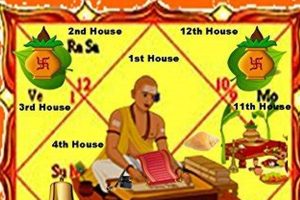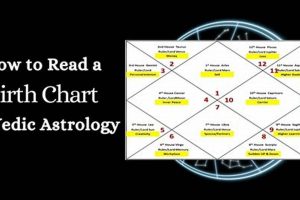Planetary periods, calculated based on the position of the Moon at the time of birth, form the foundation of this predictive system within Vedic Astrology. These periods, known as planetary cycles, influence an individual’s life experiences, shaping various aspects from career and relationships to health and spirituality. For instance, a specific planetary cycle might bring about opportunities for career advancement, while another might focus on personal growth and introspection. The system offers a nuanced understanding of the timing of these life events.
This ancient astrological technique provides a framework for understanding the cyclical nature of time and its impact on human life. By identifying the current and upcoming planetary influences, individuals can gain valuable insights into potential challenges and opportunities. This awareness empowers informed decision-making and allows for proactive navigation of life’s various phases. Rooted in ancient Vedic traditions, this method continues to be a powerful tool for self-discovery and life planning.
Further exploration of this topic will delve into the specific calculations involved, the characteristics of each planetary period, and practical applications for interpreting these astrological cycles.
Tips for Utilizing Planetary Cycle Analysis
Planetary period analysis offers valuable insights into the timing of life events. Understanding these cycles can empower informed decision-making and facilitate proactive life management. The following tips provide guidance for utilizing this ancient astrological technique.
Tip 1: Obtain an Accurate Birth Chart: A precise birth time, date, and location are essential for accurate planetary period calculations. Consulting with a qualified Vedic astrologer is recommended.
Tip 2: Understand the Specific Planetary Influences: Each planetary period carries unique characteristics and influences. Researching the specific qualities of each planet provides a deeper understanding of potential experiences during its cycle.
Tip 3: Consider the Interplay of Multiple Planetary Cycles: Various planetary cycles operate concurrently, creating complex interactions. Analyzing these overlapping influences offers a more comprehensive understanding of the current astrological landscape.
Tip 4: Use Planetary Periods for Long-Term Planning: These cycles provide insights into long-term trends and potential opportunities. This information can be utilized for setting goals and making strategic life decisions.
Tip 5: Focus on Self-Improvement during Challenging Periods: Certain planetary cycles may present challenges or obstacles. These periods can be utilized for introspection, self-improvement, and spiritual growth.
Tip 6: Seek Professional Guidance When Necessary: Interpreting planetary periods can be complex. Consulting with a knowledgeable Vedic astrologer can offer personalized insights and guidance.
Tip 7: Integrate Astrological Insights with Practical Action: Planetary cycle analysis provides valuable information, but it’s essential to combine these insights with practical action and informed decision-making.
By understanding and utilizing these principles, individuals can gain a deeper understanding of the cyclical nature of time and its impact on their lives. This knowledge empowers proactive navigation of life’s various phases and facilitates informed choices aligned with individual goals and aspirations.
The subsequent section will explore case studies demonstrating the practical application of planetary period analysis in real-life scenarios.
1. Planetary Cycles
Planetary cycles form the cornerstone of dasha Vedic astrology. These cycles, calculated based on the position of the Moon at the time of birth, delineate specific periods during which particular planetary energies exert a dominant influence on an individual’s life. The Vimshottari Dasha system, a prominent example, outlines a sequence of planetary periods, each associated with distinct characteristics and potential life experiences. The length and sequence of these cycles are predetermined, providing a structured framework for understanding the unfolding of karmic patterns and life events. For instance, a Jupiter Dasha might signify a period of growth, prosperity, and spiritual expansion, while a Saturn Dasha might bring about challenges, limitations, and a focus on discipline and responsibility. The interplay of these planetary cycles shapes individual experiences and provides a roadmap for navigating life’s journey.
The practical significance of understanding planetary cycles lies in their predictive capacity. By identifying the current and upcoming planetary periods, individuals can gain valuable insights into potential opportunities and challenges. This awareness empowers proactive decision-making and allows for strategic planning in various life areas, such as career, relationships, and personal growth. For example, an individual entering a Venus Dasha might anticipate opportunities for romantic relationships or creative pursuits, while someone embarking on a Mars Dasha might anticipate increased energy, drive, and potential for conflict. This knowledge allows for informed choices aligned with the prevailing planetary influences.
In summary, planetary cycles provide a fundamental framework for understanding the timing and nature of life events within the context of dasha Vedic astrology. This system offers a powerful tool for self-awareness, personal growth, and navigating life’s complexities with greater insight and foresight. While interpreting these cycles can be intricate, their practical application empowers informed decision-making and facilitates a deeper understanding of one’s karmic journey.
2. Timing of Events
The predictive capacity of Vedic astrology hinges upon the concept of timing. Planetary periods, or dashas, provide the framework for understanding when specific karmic influences are likely to manifest. This intricate system offers valuable insight into the opportune moments for various endeavors and the periods when challenges are more probable. An understanding of this timing mechanism is fundamental to utilizing Vedic astrology for life planning and navigating significant transitions.
- Planetary Periods and Life Stages:
Each planetary period signifies a distinct life stage with unique themes and opportunities. For example, a Jupiter dasha may correlate with a period of growth, expansion, and good fortune, while a Saturn dasha might bring about limitations, challenges, and a focus on responsibility. Recognizing these periods allows for proactive alignment with their respective energies, maximizing potential benefits and mitigating potential difficulties.
- Transits and Dasha Interactions:
Planetary transits, the ongoing movement of planets through the zodiac, interact dynamically with the underlying dasha periods. Transits can trigger specific events or amplify the themes of the current dasha. For instance, a favorable transit during a positive dasha could lead to significant achievements, while a challenging transit during a difficult dasha might exacerbate existing problems. Understanding this interplay is essential for nuanced astrological interpretation.
- Predictive Accuracy and Individual Karma:
While planetary periods provide a general framework for timing, individual karmic patterns play a significant role in how these influences manifest. The same dasha can express differently for two individuals based on their past actions and current circumstances. Vedic astrology emphasizes personal responsibility and suggests that understanding planetary influences allows individuals to make informed choices and navigate their karmic path more consciously.
- Practical Application for Decision Making:
The insights gained from understanding planetary timing can inform significant life decisions. Choosing an auspicious time for marriage, starting a business, or making a major investment can increase the likelihood of success. Similarly, anticipating challenging periods allows for proactive preparation and mitigation of potential setbacks. This practical application underscores the value of dasha Vedic astrology in navigating lifes complexities.
The intricate interplay of planetary periods and transits provides a comprehensive framework for understanding the timing of events within Vedic astrology. This predictive capacity empowers individuals to navigate lifes journey with greater awareness, aligning their actions with cosmic influences to maximize opportunities and mitigate potential challenges. By recognizing the dynamic nature of time and its impact on individual experiences, Vedic astrology offers valuable guidance for self-discovery, personal growth, and informed decision-making.
3. Karmic Influences
Dasha Vedic astrology posits a profound connection between planetary periods and karmic influences. The system suggests that the timing and nature of life experiences are not random but rather reflect the unfolding of karmic patterns. Each planetary period, or dasha, is believed to activate specific karmic seeds sown in previous lifetimes. These karmic imprints influence the individual’s experiences, shaping opportunities, challenges, and life lessons encountered during that period. For instance, a challenging period might be interpreted as a time for karmic resolution, presenting opportunities for growth, learning, and ultimately, liberation from limiting patterns.
Understanding the karmic implications of planetary periods provides a framework for interpreting life events with greater depth and meaning. Challenges are not viewed as mere setbacks but as opportunities for karmic growth and transformation. Similarly, periods of ease and prosperity may be seen as the fruition of positive karmic actions. This perspective encourages personal responsibility and empowers individuals to actively engage with their karmic journey. Consider, for example, an individual experiencing repeated relationship difficulties during a particular planetary period. Through the lens of karmic astrology, this pattern might be understood as reflecting unresolved relationship karma from a past life. This understanding can empower the individual to address underlying emotional patterns and cultivate healthier relationship dynamics.
Integrating the concept of karma into dasha analysis enhances the predictive power of Vedic astrology. By recognizing the karmic underpinnings of current circumstances, individuals can gain valuable insights into their life path and make choices aligned with their soul’s evolutionary journey. While karmic influences can be complex, dasha Vedic astrology offers a framework for understanding their manifestation in time and navigating life’s tapestry with greater awareness and purpose. The system does not promote fatalism but rather empowers individuals to actively participate in shaping their destiny through conscious action and self-awareness.
4. Predictive Tool
Dasha Vedic astrology functions as a predictive tool by utilizing planetary periods to forecast potential life experiences. Cause and effect within this system are understood through the lens of karma. Past actions create karmic imprints that influence the timing and nature of future events. Planetary periods, calculated based on the individual’s birth chart, act as triggers for these karmic influences to manifest. For example, a period ruled by a benefic planet like Jupiter may bring opportunities for growth and prosperity, reflecting positive past karma. Conversely, a period ruled by a challenging planet like Saturn might present obstacles and limitations, indicating areas requiring karmic resolution. The predictive capacity of the system stems from its ability to identify these periods and their associated karmic themes.
The importance of the predictive element lies in its potential to empower informed decision-making. By understanding the likely themes of an upcoming planetary period, individuals can make proactive choices aligned with the prevailing energies. For instance, recognizing an upcoming period of potential career growth might prompt someone to pursue professional development opportunities. Conversely, anticipating a period of potential health challenges might encourage proactive health management. Real-life examples abound where individuals have utilized these predictive insights to navigate significant life transitions, mitigate potential difficulties, and capitalize on opportune moments. This practical application underscores the value of dasha Vedic astrology as a tool for life planning and self-discovery.
In summary, the predictive capacity of dasha Vedic astrology offers valuable insights into the unfolding of one’s life path. By understanding the karmic implications of planetary periods, individuals can gain a deeper understanding of their present circumstances and make informed choices about their future. While the system does not claim to offer absolute predictions, it provides a framework for understanding the potential influences at play and navigating life’s complexities with greater awareness and agency. The integration of karmic principles and predictive timing distinguishes dasha Vedic astrology as a powerful tool for self-understanding and navigating the cyclical nature of time and experience. Challenges lie in the complexity of interpretation and the potential for misapplication, highlighting the importance of seeking guidance from experienced practitioners.
5. Vedic Astrology System
Vedic astrology, a comprehensive system originating in ancient India, encompasses various predictive techniques. Dasha systems represent a crucial component within this broader framework. While Vedic astrology provides a holistic view of an individual’s birth chart, including planetary placements, signs, and houses, dasha systems introduce the dimension of time. They delineate specific periods during which particular planetary influences become prominent, shaping the individual’s experiences. This interplay between the static natal chart and the dynamic dasha periods provides a nuanced understanding of how planetary influences unfold throughout a lifetime. One could consider the birth chart a map of the individual’s karmic potential, while the dasha system acts as a timetable, revealing when specific karmic themes are likely to manifest. For instance, a challenging planetary placement in the birth chart might indicate potential health issues. The dasha system would then reveal the specific periods during which these health concerns might become prominent. This understanding allows for proactive health management and informed decision-making.
Real-life examples illustrate the practical significance of this interconnectedness. Consider an individual with a strong Jupiter placement in their birth chart, indicating potential for wealth and prosperity. However, if the individual is undergoing a dasha period ruled by a malefic planet like Saturn, they might experience delays or obstacles in achieving financial success. This seemingly contradictory situation can be understood through the lens of dasha Vedic astrology. The challenging dasha period might represent a time of karmic lessons related to finances, requiring the individual to develop greater discipline and patience before realizing their full potential for prosperity. Conversely, a favorable dasha period could amplify the positive influences of the natal chart, leading to significant achievements and breakthroughs. Understanding this dynamic interplay between the birth chart and the dasha system allows individuals to navigate life’s ups and downs with greater awareness and preparedness.
In summary, dasha systems are integral to Vedic astrology, providing a crucial dimension of timing and karmic unfolding. They offer a framework for understanding how the static potentials of the birth chart manifest dynamically throughout a lifetime. This understanding empowers individuals to make informed choices, navigate challenges effectively, and capitalize on opportunities for growth and fulfillment. Challenges remain in the complexity of interpretation and the potential for fatalistic readings, underscoring the importance of seeking guidance from experienced and ethical practitioners. By integrating both the natal chart and the dasha system, Vedic astrology offers a comprehensive and insightful approach to self-discovery and navigating life’s intricate tapestry.
Frequently Asked Questions about Planetary Periods in Vedic Astrology
This section addresses common inquiries regarding planetary periods within Vedic astrology, aiming to provide clarity and dispel misconceptions.
Question 1: How are planetary periods calculated?
Planetary period calculations are complex and require precise birth data, including time, date, and location. These calculations are based on the longitude of the Moon at the time of birth and utilize specific formulas outlined in Vedic astrological texts. Consulting a qualified Vedic astrologer is recommended for accurate determination.
Question 2: What is the significance of the Vimshottari Dasha system?
The Vimshottari Dasha system is the most widely used dasha system in Vedic astrology. It outlines a 120-year cycle comprised of specific planetary periods, each associated with distinct characteristics and karmic influences. This system provides a comprehensive framework for understanding the unfolding of life events over a significant portion of an individual’s lifespan.
Question 3: Can planetary periods predict the exact timing of events?
Planetary periods provide a general timeframe for potential experiences, but they do not predict the exact timing of events with absolute certainty. Individual karma, free will, and other astrological factors influence the precise manifestation of these periods. Vedic astrology emphasizes understanding potential influences rather than deterministic predictions.
Question 4: How can understanding planetary periods be practically applied?
Understanding planetary periods can empower informed decision-making in various life areas. By anticipating potential challenges or opportunities associated with upcoming periods, individuals can make proactive choices aligned with the prevailing energies. This knowledge facilitates strategic planning and navigating life transitions with greater awareness.
Question 5: Are challenging planetary periods always negative?
Challenging planetary periods are not inherently negative. They often represent periods of karmic lessons and opportunities for growth. These periods may present obstacles, but they also offer opportunities for self-improvement, spiritual development, and ultimately, liberation from limiting patterns.
Question 6: What is the role of free will in the context of planetary periods?
While planetary periods represent karmic influences, Vedic astrology emphasizes the importance of free will. Individuals have the agency to respond to these influences consciously, making choices that shape their experiences and ultimately their destiny. Understanding planetary periods provides a roadmap, but individuals retain the freedom to navigate their journey.
These answers provide a foundational understanding of planetary periods in Vedic astrology. Further exploration and consultation with a qualified astrologer can provide more personalized insights.
The next section will delve into specific case studies demonstrating the practical application of planetary period analysis in real-life scenarios.
Conclusion
Planetary period analysis within Vedic astrology offers a structured framework for understanding the timing of life events and their connection to karmic influences. This system provides valuable insights into potential opportunities and challenges, empowering informed decision-making and proactive life management. Exploration of planetary cycles, their predictive capacity, and their karmic implications reveals a powerful tool for self-discovery and navigating life’s complexities.
The intricate interplay of planetary periods and transits offers a profound lens through which to understand the cyclical nature of time and its impact on human experience. Further research and exploration of this ancient astrological technique can yield deeper insights into the unfolding of one’s karmic journey and empower conscious participation in shaping one’s destiny. The insights offered by this system encourage a proactive approach to life, empowering individuals to navigate their unique path with greater awareness and purpose.







